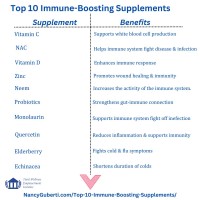
A robust immune system is the cornerstone of overall health and wellness. By strengthening your immunity, you can better protect your body against infections, illnesses, and even chronic diseases. While a healthy diet and lifestyle are essential for immune support, certain supplements can provide targeted benefits. Below is an in-depth exploration of the top 10 immune-boosting supplements, their benefits, and how they work to fortify your defenses.
1. Vitamin C
Overview: Vitamin C is a powerful antioxidant that plays a crucial role in immune function. It helps protect cells from free radical damage and supports the production of white blood cells, which are vital for fighting infections.
Benefits:
Enhances the production of lymphocytes and phagocytes, key components of the immune system.
Reduces the duration and severity of colds.
Promotes skin health, acting as a barrier to pathogens.
Sources: Citrus fruits, strawberries, bell peppers, broccoli, and supplements.
Dosage: The recommended daily intake is 75-90 mg, but during illness, higher doses of 1,000-2,000 mg may be beneficial.
2. Vitamin D
Overview: Known as the “sunshine vitamin,” vitamin D is critical for immune regulation. Many people have insufficient levels, particularly during the winter months.
Benefits:
Modulates the immune system to reduce inflammation.
Enhances the pathogen-fighting effects of monocytes and macrophages.
Low levels of vitamin D are linked to increased susceptibility to infections.
Sources: Sunlight, fatty fish, fortified foods, and supplements.
Dosage: The general recommendation is 600-800 IU daily, though some may require higher doses depending on deficiency.
3. NAC (N-Acetyl Cysteine)
Overview: NAC is a precursor to glutathione, one of the body’s most potent antioxidants. It aids in detoxification and protects against oxidative stress.
Benefits:
Boosts glutathione levels, enhancing the immune response.
Reduces inflammation and oxidative stress.
Supports respiratory health by breaking down mucus.
Sources: Found in supplements as NAC, not typically present in food.
Dosage: Typical doses range from 600-1,200 mg per day.
4. Zinc
Overview: Zinc is an essential mineral that supports numerous enzymatic reactions and is vital for immune cell function.
Benefits:
Enhances the activity of T-cells and natural killer cells.
Reduces the duration of colds by inhibiting viral replication.
Promotes wound healing and tissue repair.
Sources: Oysters, red meat, poultry, beans, and fortified cereals.
Dosage: The recommended daily intake is 8-11 mg, though short-term supplementation of up to 40 mg may be beneficial during illness.
5. Neem
Overview: Neem is a traditional Ayurvedic herb known for its antimicrobial and anti-inflammatory properties.
Benefits:
Exhibits antiviral, antibacterial, and antifungal activities.
Enhances the body’s natural defense mechanisms.
May reduce inflammation associated with infections.
Sources: Neem leaves, oil, or supplements.
Dosage: Typical doses range from 300-500 mg per day.
6. Probiotics
Overview: Probiotics are beneficial bacteria that support gut health, which is intricately linked to immune function.
Benefits:
Strengthens the gut barrier to prevent the entry of pathogens.
Modulates immune responses to reduce inflammation.
Specific strains, such as Lactobacillus and Bifidobacterium, have been shown to enhance immunity.
Sources: Yogurt, kefir, sauerkraut, kimchi, and probiotic supplements.
Dosage: Look for a supplement with multiple strains and at least 10 billion CFUs (colony-forming units) daily.
7. Monolaurin
Overview: Derived from lauric acid, monolaurin is a natural compound with potent antimicrobial properties.
Benefits:
Disrupts the lipid membranes of harmful bacteria, viruses, and fungi.
Supports the immune system by reducing the pathogen load.
Effective against a wide range of infections, including common colds and flu.
Sources: Coconut oil and monolaurin supplements.
Dosage: Typical doses range from 300-1,000 mg daily.
8. Echinacea
Overview: Echinacea is a popular herbal remedy used to prevent and treat respiratory infections.
Benefits:
Stimulates the production of white blood cells.
Reduces the duration and severity of colds.
Exhibits antiviral and anti-inflammatory properties.
Sources: Echinacea teas, tinctures, and supplements.
Dosage: 300-500 mg three times daily for acute use; lower doses for maintenance.
9. Elderberry
Overview: Elderberry is rich in antioxidants and bioactive compounds that support immune health.
Benefits:
Reduces cold and flu symptoms by boosting cytokine production.
Contains anthocyanins, which fight oxidative stress.
May reduce the severity of respiratory infections.
Sources: Elderberry syrups, gummies, and supplements.
Dosage: 1-2 teaspoons of syrup daily for prevention; up to 4 teaspoons during illness.
10. Quercetin
Overview: Quercetin is a flavonoid with potent antioxidant and anti-inflammatory effects.
Benefits:
Modulates immune responses to reduce inflammation.
Exhibits antiviral properties, particularly against respiratory viruses.
Enhances the absorption of zinc, further boosting immunity.
Sources: Apples, onions, berries, and supplements.
Dosage: Typical doses range from 500-1,000 mg daily.
Combining Supplements for Maximum Effect
For optimal immune support, consider combining these supplements strategically. For example:
Pair Vitamin C with Zinc to enhance antiviral effects.
Combine Probiotics with Neem to support gut health and fight infections.
Use Quercetin alongside Vitamin D to maximize anti-inflammatory benefits.
Precautions and Recommendations
This is for educational primroses only, it does not offer any medical advice.
Always consult with a healthcare provider before starting new supplements, especially if you have underlying health conditions or take medications.
Prioritize supplements derived from high-quality sources to ensure efficacy and safety.
Remember that supplements should complement, not replace, a healthy diet and lifestyle.
Conclusion
Incorporating these top 10 immune-boosting supplements into your routine can help fortify your defenses against illness and promote overall well-being. Coupled with a nutrient-rich diet, regular exercise, and adequate sleep, these supplements can give your immune system the extra support it needs to keep you healthy year-round. Start today and take proactive steps toward a stronger, more resilient you. Always check with your medical doctor before starting any new supplement, this is not medical advice. Here are the supplements that I personally choose from: https://us.fullscript.com/plans/nancyguberti-immune-boosting-supplements
Stop guessing what your body needs and gain insight into your how your body is functioning internally and where the imbalances are, and find out what your body really needs for you.
Test don’t guess anymore.
Tags: Functional medicine lab, monolaurin, NAC, Nancy Guberti, Neem, organic acid test, Test don't guess, Top ten Immune boosting supplemetns, Total Wellness Empowerment Institute
Leave A Reply (No comments So Far)
No comments yet